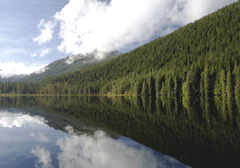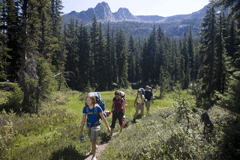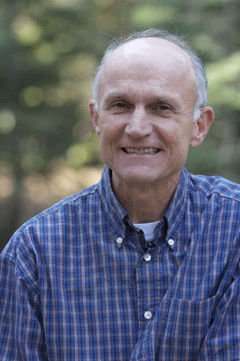The End of the Road
Air Date: Week of June 5, 2009

The Tongass National Forest.
Our national forests will continue to be less traveled, at least for another year. President Obama recently declared a one year moratorium on building new roads in national forests. Host Bruce Gellerman asks Mike Anderson, a senior resources analyst with the Wilderness Society in Seattle, how halting the roadless ruling will affect the nation’s wilderness.
Transcript
GELLERMAN: For the last nine years, since the end of the Clinton administration, there’s been an ongoing battle over the building of roads in our National Forests. President Clinton banned most new roads in the pristine parts of the forest. President Bush then moved to repeal the ban and allow road construction, triggering court challenges.
Now the Obama administration is reviewing Mr. Bush’s action. And in the meantime it’s suspending any road building in the National Forests. Michael Anderson, a Senior Resources Analyst with the Wilderness Society in Seattle, says President Obama’s decision affects a huge part of the country.
ANDERSON: Nationwide it’s almost 58 million acres, about two and a half percent of all the land in the United States. And it covers 39 states.
GELLERMAN: A good chunk of this land is in Alaska, right?
ANDERSON: Yeah, Alaska has the most of the national forest roadless land.
GELLERMAN: So how would this affect that national forest land?

The Tongass National Forest.
ANDERSON: The protection will ensure that the magnificent temperate rainforests of the Tongass National Forest will not be logged within the roadless areas.
GELLERMAN: This is a very special forest, I understand.
ANDERSON: Oh yes, it has tremendous scenic values, fabulous salmon runs, it’s really probably the finest wild land that we have in the national forest system anywhere in the country.
GELLERMAN: You know this has been really a long and winding and bumpy road for this piece of regulation.
ANDERSON: That’s right. The Clinton administration went through a very extensive public process. It was I think the largest amount of public comment that had ever taken place on a federal rule making. 1.7 million people commented and over 90 percent were strongly in support of protecting the roadless areas. So the Bush administration came in with a very different perspective on national forests and the roadless areas. They suspended the Clinton administration’s policy from the very first day. Fortunately however, only seven miles of road were actually built during those eight years.
GELLERMAN: What’s the fear of building a road through a national forest? What’s the problem?

A family enjoys a hike in the Liberty Bell Roadless Area in the North Cascades of Washington state. (Courtesy of Holly Werran, of REI)
ANDERSON: Road building brings with it a lot of baggage, ecological baggage. For one thing, it causes erosion and harms the water quality of the streams. It hurts the fish habitat out in the northwest here, the Pacific salmon are able to spawn in these roadless areas in clean water and good quality habitat. And when you build a road in, you’re gonna often times lose that pristine quality of the water for the wildlife habitat and it reduces your opportunities for a nice hiking experience in the back country.
GELLERMAN: I know that some groups especially in the western part of the country say this is an issue of state rights, you know, we had California instituting cleaner air standards than the rest of the country and they asserted state rights issues. Is this not a states right question?
ANDERSON: Well if these were state forest lands, yes. But these are national forests, these are lands that are owned by all the American people, just like our national parks and national wildlife refuges. So it’s really not in the purview, we don’t think of state governors or state legislators to be dictating how the national forests or the national parks are going to be managed. It’s really a matter of the federal government and they should be answerable to all the American people, whether you’re in Chicago or New York. People care what happens up in the Tongass National Forest and the Idaho National Forest.
GELLERMAN: So we’re talking about national forest land here, right?
ANDERSON: Yes.

Michael Anderson is a lawyer for the Wilderness Society. (Courtesy of: John Waller)
GELLERMAN: And in the national forest there’s a much more strictly controlled part of land called “wildernesses” right?
ANDERSON: Yeah, those are lands that are designated by Congress under the Wilderness Act.
GELLERMAN: Well how if at all would this, you know, block on building roads affect wildernesses?
ANDERSON: It wouldn’t directly affect the wilderness areas within the national forest, but it does provide an opportunity for Congress in the future to designate additional wilderness areas because these will be areas that are kept basically in a pristine condition.
GELLERMAN: Well why just a one year, you know, block on building roads in national forests?
ANDERSON: Well this is an important first step for the Obama administration. They’re still getting their staffing together. This is a pretty tricky issue for the new administration and I think they’re just wanting to take things one step at a time, which I think makes perfect sense. There’s a lot that needs to be undone from what the Bush administration has tried to do with undoing protection of roadless areas. So it’s gonna take some time and a number of steps over the coming years.
GELLERMAN: Well Michael, thank you very much. I really appreciate it.
ANDERSON: You’re very welcome.
GELLERMAN: Michael Anderson is a Senior Resources Analyst with the Wilderness Society.
Links
Living on Earth wants to hear from you!
Living on Earth
62 Calef Highway, Suite 212
Lee, NH 03861
Telephone: 617-287-4121
E-mail: comments@loe.org
Newsletter [Click here]
Donate to Living on Earth!
Living on Earth is an independent media program and relies entirely on contributions from listeners and institutions supporting public service. Please donate now to preserve an independent environmental voice.
NewsletterLiving on Earth offers a weekly delivery of the show's rundown to your mailbox. Sign up for our newsletter today!
 Sailors For The Sea: Be the change you want to sea.
Sailors For The Sea: Be the change you want to sea.
 The Grantham Foundation for the Protection of the Environment: Committed to protecting and improving the health of the global environment.
The Grantham Foundation for the Protection of the Environment: Committed to protecting and improving the health of the global environment.
 Contribute to Living on Earth and receive, as our gift to you, an archival print of one of Mark Seth Lender's extraordinary wildlife photographs. Follow the link to see Mark's current collection of photographs.
Contribute to Living on Earth and receive, as our gift to you, an archival print of one of Mark Seth Lender's extraordinary wildlife photographs. Follow the link to see Mark's current collection of photographs.
 Buy a signed copy of Mark Seth Lender's book Smeagull the Seagull & support Living on Earth
Buy a signed copy of Mark Seth Lender's book Smeagull the Seagull & support Living on Earth

